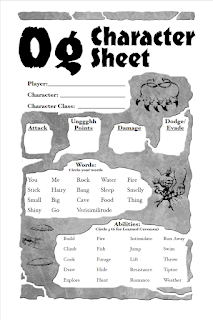Domain-Level play, Reasons for adventuring, and Crack Cocaine.
Roughly 1 in 4 PCs die in the campaigns I run. I'm a kind DM however, so to save the players the emotional trauma of losing their beloved PC, I just have everyone who rolls a 1 on a d4 rip up their sheet and make a new one.
Of course I don't actually do that, but the 1 in 4 death rate is actually accurate, and not just for adventurers- The same mortality rate applied to crack dealers in 90s Chicago. This might lead you to think that this line of work would be unpopular, and the few in this profession would be compensated highly. Surprisingly, that was not the case. Selling crack was actually so popular that there were more dealers than there were street corners for them to stand on. 25,000 people were betting their lives on this career, despite most of them earning just 3.30$/hour.
 |
| If you're running DCC, the odds of dying are more like 3 in 4. |
You might be wondering then, why was crack dealing so popular? "Well, for the same reason that a pretty Wisconsin farm girl moves to Hollywood. For the same reason that a high-school quarterback wakes up at 5 a.m. to lift weights", explains Freakonomics: "They all want to succeed in an extremely competitive field in which, if you reach the top, you are paid a fortune". Being the leader of a local gang was a highly paid and very lucrative position to kids growing up in these neighborhoods, and with few other options for upwards social mobility, it seemed like their only way to make it big.
Just as drug dealing is a much worse profession than it seems on TV, adventuring isn't all slaying dragons and wooing maidens. Adventurers face similarly poor working conditions; The high mortality rate needs no explanation, but some readers might be surprised at the idea that adventurers make a relatively poor wage. If you are one of those readers, consider a 500gp haul from a dungeon for example- If you divide that amongst 5 surviving PCs, each one doesn't even have enough to live comfortably for a year, by d&d5e rules. How many of your PCs have ever actually accumulated enough treasure to retire?
How can I use this in my game?
Common questions such as "Why did my character become an adventurer?" and "Why is the lord sending us to do this quest, rather than sending his soldiers?" require good answers to keep the setting believable and to keep players and DM alike immersed. Basing your campaign on the structure of how a gang works gives you an easy answer to these questions.
In this comparison, the peasants are the masses of people with no opportunities for social mobility. They are stuck in this position- unless they risk their life. The lord has dangerous dungeons strewn across his land with ancient treasures he wants to get his hands on, and he offers his peasants the chance to go get it for him. Many will not return, and many will give up- Just as many a failed actor becomes a waiter, the one-armed adventurer becomes a questgiver. A few of these peasants though, will return with their skin and get to keep some of the treasure they find, and those who are able to return multiple times might get to become a knight or a court wizard. Having already had experience with domain-level play since level 1, they'll have a good understanding of how domains work, should they rule their own one later.
All we're really doing here is basing our characters' motivations off of the material conditions of our world. Doing this by hand can be quite complex, so instead we're copying a real life situation. We can continue on this track to answer common worldbuilding questions, including: "Who owns this land?" and "What does the lord want?"
Thankfully, Freakonomics can give an interesting answer to these questions too, with a story of a gang war: After several peaceful years, a turf war started with a neighboring gang. Drive-by shootings became a common occurrence. Dealers wanted to be paid extra for the added risk of getting shot, and customers were scared to come out to buy. So why did their leader start this war? As it turns out, he didn't. His dealers started the war, against his will. The leader wanted to keep the peace and keep business flowing, while his underlings wanted to make a name for themselves, they wanted a chance to prove what they're capable of. In a similar way, the lord wants the peasants to keep peacefully doing his bidding, but they might stand to earn more treasure going into the nearby lands of a human clan or a gnoll tribe, and seeing what treasure they can steal from there.
Setting your players free in a world like this, where others are also out for the same treasure as they are, will quickly get them thinking just like a gang dealer- in an entrepreneurial way. They'll devise clever plans to get an edge over the competition, play with factions like they're toys, and rise to the top of the food chain (or die trying).



Comments
Post a Comment